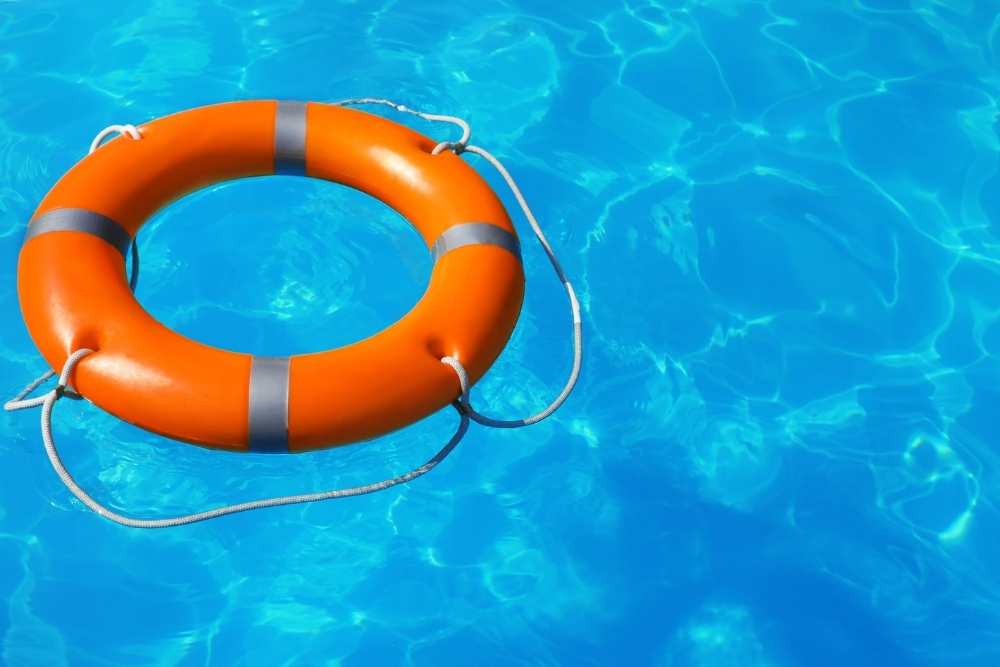
Summertime means pool time. With temperatures rising, there’s no better place to be with your family than poolside. As you get ready to enjoy your pool during the hottest time of the year, there’s a few water safety tips you’ll want to keep in mind. From sanitizing pool water to designating a water watcher, make swimming pool safety a priority on your property this summer. You’ll also want to establish a few ground rules to ensure everyone has a safe time in the pool.
Here’s a list of our 10 favorite water safety tips to help everyone have fun in the sun:
1. Watch the Water Quality
Before you volunteer your backyard pool for a big summer gathering, you’ll want to make sure it’s clear and clean for guests to enter. Test pH levels, adjust pool chemicals as needed, and skim the pool for leaves, insects, and debris. Don’t forget to empty your skimmer basket! Pools should be maintained weekly, too.
For best results and less build-up:
Use shock
Add an algae preventative
Clean pool tiles
Brush pool walls
Have swimmers shower before entering the pool
Safety First Reminder – To avoid spreading disease or illness, don’t let anyone experiencing diarrhea swim. Make sure toddlers and babies wear swim diapers in the pool.
2. Store and Handle Pool Chemicals Safely
As a pool owner, it’s important to use the appropriate chemicals to keep pH levels balanced and the pool clean from dirt, sweat, and other bodily fluids. As most parents know, kids are curious, which means you’ll want to lock up your chemicals where they won’t have access to it.
Pool chemical safety tips:
Keep chemicals off the pool deck
Lock or store chemicals out of sight
Minimize chemical misuse by keeping original containers
Safety First Reminder – Tape the poison control hotline number to your fridge and put it in your phone in case a child ingests pool chemicals or gets burned. The number is 1-800-222-1222 and the website is www.poison.org.
3. Update Your Safety Measures
Add layers of protection to help swimmers have the safest experience in your pool. Many states require specific safety measures, including a pool fence. In Texas, homeowners with pools must have at least a 4-foot-high fence surrounding the pool, along with self-locking, self-latching gates.
What to look for during safety checks:
Look at barriers – Check for broken boards in your fence that small children could sneak through to get to your pool. Make sure gates latch properly.
Check safety equipment – Inspect safety equipment to ensure it’s in good condition (life preservers, life hook, etc.).
Fix broken parts – Ensure pool drains are compliant to avoid too strong of a suction that could snag bathing suits or hair.
Safety First Reminder – Keep a first aid kit handy and nearby, too. Sometimes scrapes and cuts happen on the pool deck, so keep a variety of bandages and antiseptics on hand. As a safety precaution, don’t allow bleeding swimmers to re-enter the pool.
4. Take Swim Lessons
As a family, consider taking swim lessons at your local YMCA or recreation center. It’s great exercise and includes swimming pool safety education that all children should know. Formal swimming lessons can reduce the likelihood of childhood drowning, too. Avoid the emergency room this summer by ensuring everyone knows how to swim safely.
Swim lesson tips:
Start kids young
Be patient
Seek out professional swim instructors
Help kids feel safe
Make it a fun experience
Safety First Reminder – Swim lessons build confidence in the water, especially for younger kids. Never let children swim alone, even if they are excellent swimmers.
5. Learn CPR
This may be one of the most important emergency response skills you can have in regard to water pool safety. In the unfortunate event, you need to use Cardiopulmonary Resuscitation (CPR), you’ll want to have the skills necessary to perform the task. This life-saving technique can help revive a swimmer who may have stopped breathing or even suffering from a medical condition, like a heart attack. By performing CPR immediately, it can double or triple survival chances after cardiac arrest.
What is CPR?
Short for Cardiopulmonary Resuscitation, CPR is an emergency, life-saving response that’s performed when the heart stops beating.
Safety First Reminder – You don’t have to get certified to gain the life-saving benefits of a CPR course. For $30, you can take the child and baby first aid/CPR/AED online class in the convenience of your own home.
6. Use Layers of Protection
There isn’t just one way to keep your pool safe. Experts recommend using multiple layers of protection to prevent drowning accidents. This is especially important for families with young children. One of the best barriers are pool gates. But pool gates only work if you close them. Swim lessons, pool barriers, alarms, and emergency response skills are all easy ways you can keep your backyard safer during swim sessions. A rope and float line that reminds kids to swim in the shallow end can also be helpful in keeping them within their swimming limits.
Pool safety equipment to consider investing in:
Door alarms
Pool fence
Gate alarms
Pool safety alarm
Safety covers
Self-latching gates
Safety First Reminder – Keep your pool gates closed and alarms in good working order, especially on sliding glass doors. When a kid isn’t in sight and it’s not swim time, always check the pool first.
7. Designate a Water Watcher
Pools are a great place to gather during hot, muggy days. With school out for the summer, kids want to stay active, and the pool is the ideal place to burn off some energy. No matter how many adults are around the poolside, someone should be actively in charge of watching swimmers. Active adult supervision is a must when kids are present in or near a pool. Consider using a water watcher lanyard that the designated adult must wear as a reminder that they are on pool duty.
Who should be a water watcher? Someone who is:
16 or older
Alert and sober
Knows CPR
Physically and mentally capable
Safety First Reminder – If you’re the adult water watcher on duty, put away your phone. A child can drown in seconds, and it’s often silent. Don’t let your phone distract you. If you must step away, ask another able-bodied adult to take charge until you return.
8. Use Sunscreen
Sunburns can be sneaky. You’re out having a good time, and then a few hours later you’ll be indoors and notice your skin is red and blistered. Wearing sunscreen along with sunglasses and a hat can protect your skin’s largest organ and help you avoid a nasty burn.
To avoid painful post-swim sunburn:
Apply sunscreen before you put your swimsuit on
Use a broad-spectrum sunscreen of SPF 30 or higher
Reapply often and after water time
Safety First Reminder – By using sunblock, you can prevent premature aging and the chance of skin cancer developing later in life. If possible, avoid the sun between 10 a.m. and 4 p.m., when the sun’s rays are strongest.
9. Monitor for Heat-Related Illnesses
Luckily, heat-related illnesses are preventable. Keep an eye on swimmers and those sunbathing on pool decks. Summer temperatures can rise quickly, as can the human body temperature.
To avoid heat-related illness:
Stay hydrated
Seek shade or cooler areas if sun is too intense
Avoid time outdoors when temperatures are too hot
Safety First Reminder – Watch and know the signs for heat stroke, heat exhaustion, sunburn, or heat cramps or rash. The Centers for Disease and Control has a handy chart of what symptoms to watch for and how to treat each.
10. Enforce the Rules
Like any other recreational area, pools should come with a set of rules everyone knows to follow. Whether you post a sign or verbally announce rules to guests, enforcement is key to keeping everyone safe.
A few rules to consider for pool time:
No running
No diving
No roughhousing
No glass on the pool deck
No drinking alcohol and swimming
Safety First Reminder – Sometimes younger kids will need a few reminders of what the pool rules are when they get too excited. Let them know the rules are meant to allow them to have fun safely.
Pool Time Should Be a Safe Time
Have a conversation about pool safety before your family even steps foot onto a pool deck. If you’re a parent, it’ll give you peace of mind that you are doing all you can to prevent accidents.
A little preparation with equipment, skills, and resources almost guarantees that time spent in the pool is safe for everyone. By keeping your pool in good working order and using common sense, your pool can serve as a relaxing oasis to cool down in the blistering summer heat.
With these swimming pool safety rules in mind, we hope you get the most out of your best backyard water feature in the coming weeks!
What are the rules at your house for family swim times? Share your favorite water safety tips in the comments below!





